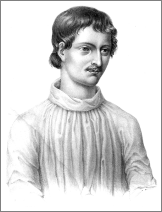The directory «Plots»
Bruno Giordano
(1548—1600)

Italian philosopher and poet, b. Nola. He entered the Dominican order early in his youth but was accused of heresy and fled (c.1576) to take up a career of study and travel. He taught briefly at Toulouse, Paris, Oxford, and Wittenberg, but, personally restless and in constant opposition to the traditional schools, he found no permanent post. His major metaphysical works, De la causa, principio, et uno (1584, tr. The Infinite in Giordano Bruno, 1950) and De l’infinito, universo et mondi (1584), were published in France. Further works appeared in England and Germany. Bruno also wrote satire and poetry. In 1591 he returned to Venice, where he was tried for heresy by the Inquisition. After imprisonment at Rome, he was burned to death. Bruno challenged all dogmatism, including that of the Copernican cosmology, the main tenets of which, however, he upheld. He believed that our perception of the world is relative to the position in space and time from which we view it and that there are as many possible modes of viewing the world as there are possible positions. Therefore we cannot postulate absolute truth or any limit to the progress of knowledge. He pictured the world as composed of individual elements of being, governed by fixed laws of relationship. These elements, called monads, were ultimate and irreducible and were based on a pantheistic infinite principle, or cause, or Deity, manifest in us and in all the world. Bruno’s influence on later philosophy, especially that of Spinoza and Leibniz, was profound.
Bulgaria, 1998, Giordano Bruno
Italy, 2000, Bust of Bruno, Quell, Text